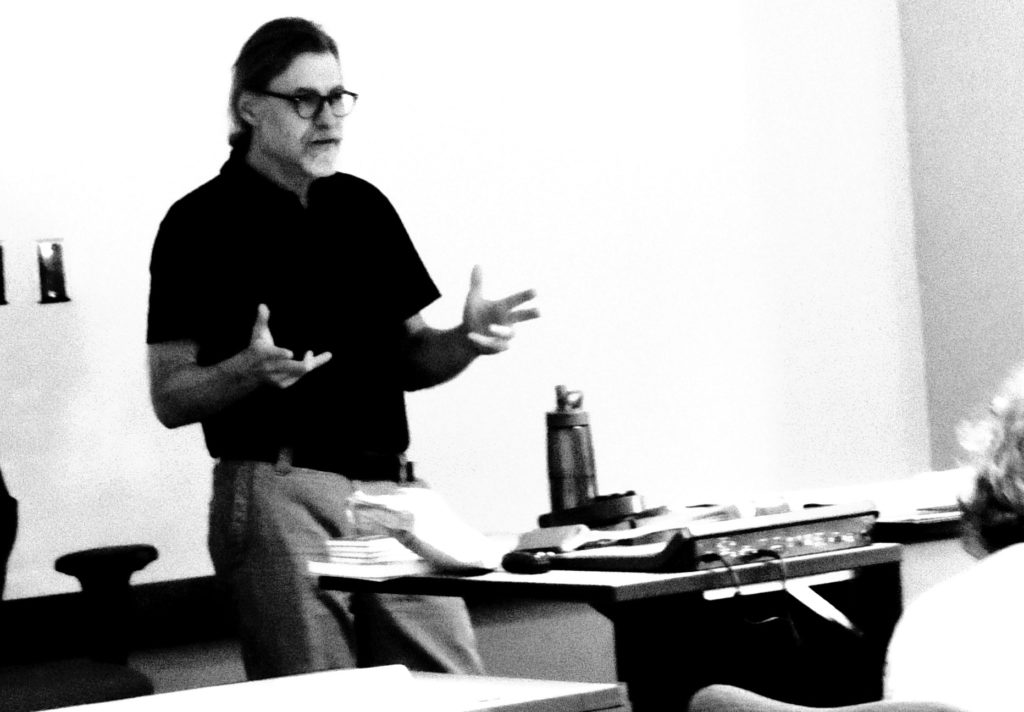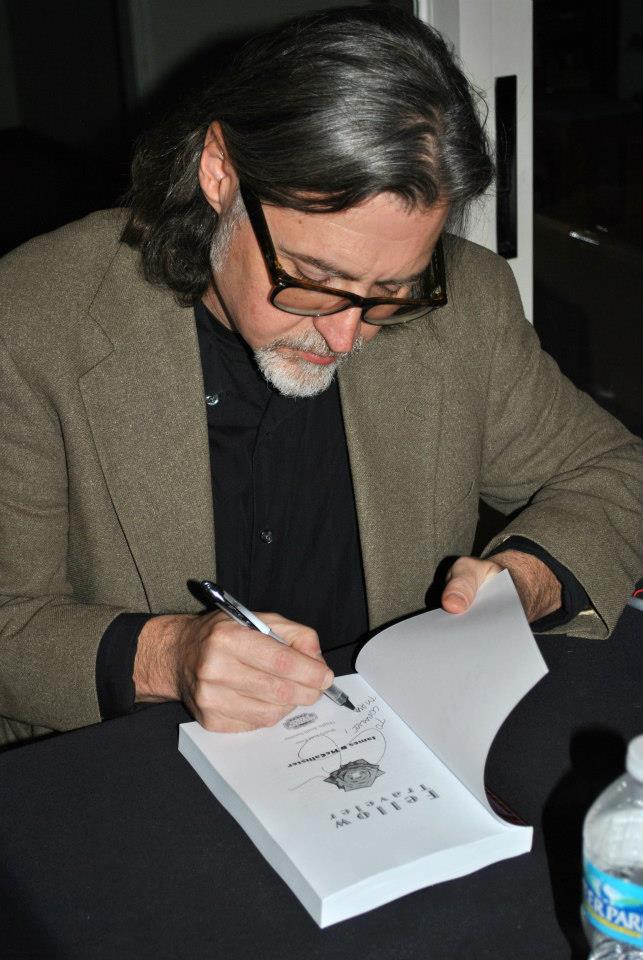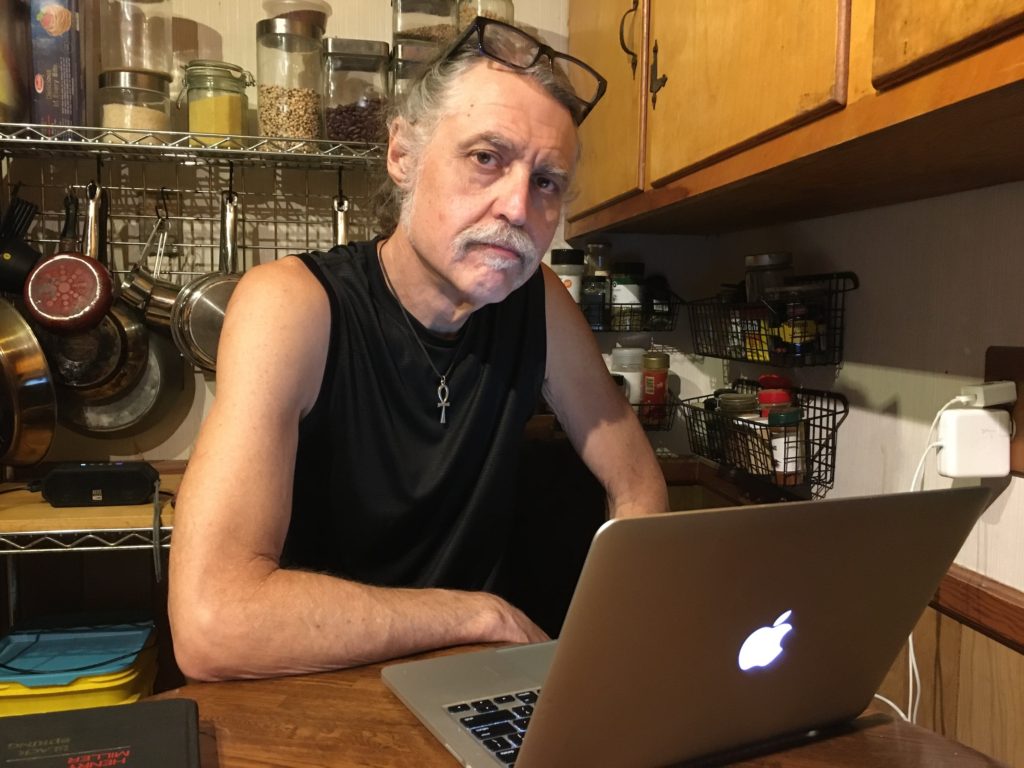My Writing Journey, Pt 7: I Grieve These Enormous Endings

Local Author Ponders Completion of a Life Project
The title of this piece, a snatch of phrase taken from my poet’s notebook, popped in my head one day and I wrote it down. That’s what a writer does. A wise one, anyway.

The pedagogue discourses on matters literary.
A record of observations in the moment is key to later success in filling pages more formal in nature. The pedagogy of my writing instruction is steeped in the encouragement of note-taking. Whenever a detail about life, small or large, captures the attention, write it down. Speak it into the voice memo app. Whatever you need to do to capture the information, you do. These targeted visitations from the muse may not only be capricious and fleeting, but if one fails often enough in encouraging their visits through focused attention and diligent work, they may cease to arrive altogether.
A scrap or fragment, a turn of phrase, a word I haven’t yet learned… of these things I still take note. But today, I find I rarely write down observations and whatnot in the pocket-size Moleskine. I still carry it the way I once did, as well its full size companion nestled down among tarot card decks in my old SC Writer’s Workshop tote bag. Dust accumulates on a stack of shrink-wrapped Moleskines in my office, near the desk at which I once wrote books. Whether plotting novels or creating characters, or conducting an interview or reviewing a fellow writer’s novel, back in my heyday, boy-howdy, did I fill up those notebooks. I let nothing of interest escape my due consideration. Or so I tried.
 This note-taking was more than a casual affectation—I never knew when I might later ‘need’ such a detail to fill out a scene or a character interaction, to add color or sometimes symbolic meaning to a passage of fiction in my Edgewater County series of novels and stories. I wrote it down, wrote it all down.
This note-taking was more than a casual affectation—I never knew when I might later ‘need’ such a detail to fill out a scene or a character interaction, to add color or sometimes symbolic meaning to a passage of fiction in my Edgewater County series of novels and stories. I wrote it down, wrote it all down.
These days? Not so much.
Well—’nothing’ persists in failing to escape my scrutiny, but I don’t necessarily make a note about what I’ve seen/thought/felt. I’m no longing creating characters, crafting plot, stylizing the language of narrative. I don’t need to keep hold of these details and observations, not the way I once did. I am more interested in Being, in the now, and letting the experience wash over me in a warm wave of centered and present satori.
My novelist’s journey has come to a close.
All such striving has ceased.
I grieve this enormous ending.

The author at 17, in a photo staged for the yearbook to accompany a sidebar about my literary leanings.
And yet, I write.
As indicated, the poetry still simmers on the stove with such elegant phraseology as ‘I grieve these enormous endings.’ I’m tinkering with a memoir; I’m scribbling here and there on a kind of book of personal philosophy called The Fourth Condition. Creativity hasn’t gone to ground, it is channeled into different directions. That I only feel truly ‘dry’ lies in the direction of fiction, which is dead anyway as a mover of the cultural needle, seems no great tragedy. Not with that ‘nice little shelf of books’ I’m leaving behind.
That’s right—I can flip through the published versions of my fictional corpus and feel pride and accomplishment, still, or even be entertained or shocked by my work, as by now I’ve forgotten much of the text I wrote. I can revisit this work anytime and feel surprised—even pleased. Ask any self-discerning, honest artist how they feel about their output. Trust me, my situation is a win.
A problem, however: The novels, four of which are windy affairs of 150k or more words, took such volumes of energy to complete, much less publish, that it’s hard to find a worthy new object/project into which I feel moved to channel such an intense focus of resources, intellectual, emotional and spiritual alike, as I mustered to write the books.

The author at 47, signing at the book release for Fellow Traveler.
For over forty years I dreamed of writing such novels, working with diligence for over twenty at accomplishing the task. Saying that I now suffer a vacuum in my daily activity, at least compared to the halcyon days of ambition and toil of my mid-life authorial run, represents understatement.
Not that my time isn’t filled. I pursue personal scholarship for an hour or two a day, reading and making different sorts of notes from the old way; and frankly, the family business down in Five Points is so successful that for the last two years I’ve put in more forty-hour weeks at the shop than in many moons. It’s another aspect of my life that’s a success, in this case a thriving, ongoing one.
Let’s face it—partnering with Jenn in running the business for 25 years has constituted another form of chasing the dream, and will continue to fulfill its role in that regard. The loving interactions I enjoy during every shift at our family business fill my heart and fulfill another dream, one I could never have articulated even if I’d tried in a novel twice as long as the door-stops I wrote for real. No, boredom isn’t typically a problem, nor is staying busy, nor is a lack of spiritual, personal fulfillment.
But, pursuing the art life? The dream of writing? A special type of magic lies and lives in the creative endeavors which burst forth from the heart and soul. And I already find myself missing those weeks and months of research, composition and editing of my precious novels. Magic time.

The author at 56, who now prefers working at the kitchen table
![]() Again: the poetry fills a need, sure, and has its own magical qualities, but I’m detached from that work in a way I never was with the fiction: I throw the words against a wall and see what sticks, then keep throwing until a poem-like block of text emerges. Quite different from intricate plotting, weaving subtext, crafting sharp dialogue between characters who seem to live and breathe inside one’s head.
Again: the poetry fills a need, sure, and has its own magical qualities, but I’m detached from that work in a way I never was with the fiction: I throw the words against a wall and see what sticks, then keep throwing until a poem-like block of text emerges. Quite different from intricate plotting, weaving subtext, crafting sharp dialogue between characters who seem to live and breathe inside one’s head.
Am I sure mine is the best way to craft poetry resonating with universality and broad appeal? No, but then, nor did my approach to novel writing appeal to mass market tastes, themes and plots. Like the modestly-selling books themselves, which tended to challenge the reader as much as entertain them, in the end the poetry process seems mainly for my own amusement and challenge. A creative outlet.
That said, I do have five poems in print now, however, which does make me an actual poet, even if the term feels odd in my mouth. Others have read the work and responded. Well, good. As I always tell writing students, that’s a side benefit to having experienced the process of crafting the art. So, too, is monetary remuneration for one’s efforts. It can only be considered icing on a delicious cake of which one has already tasted the fullest expression of its mysterious and illuminating flavors.
When I describe myself as a Southern literary novelist, however, these words still feel just exactly perfect. And while neither the books themselves nor Mind Harvest Press is going away, the void left by completing a two-decade attempt to fill up a shelf with books worth reading, and by which my ego always hoped I might one day be remembered, looms before me dark and mysterious. What now, Mr. Author? What now?
About dmac
James D. McCallister is a South Carolina author of novels, short stories, journalism, creative nonfiction and poetry. His neo-Southern Gothic novel series DIXIANA was released in 2019.